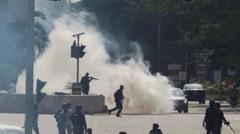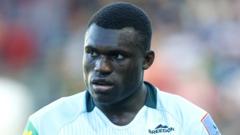Why Did Nigerian Police Use Tear Gas Against Protesters Demanding Justice for a Separatist Leader?

Published: 2025-10-20 15:00:19 | Category: world
Recent protests in Abuja, Nigeria's capital, have highlighted deepening tensions surrounding the continued detention of Nnamdi Kanu, leader of the separatist group Indigenous People of Biafra (IPOB). Demonstrators, led by activist Omoyele Sowore, are demanding Kanu's immediate release amidst ongoing legal battles and accusations of terrorism. The Nigerian police's response, involving tear gas and road blockades, has intensified scrutiny on both the government's approach to dissent and the broader implications for regional autonomy.
Last updated: 12 October 2023 (BST)
Background on Nnamdi Kanu and IPOB
Nnamdi Kanu is a prominent figure in Nigeria's socio-political landscape, particularly among the Igbo people in the south-eastern region. He is the leader of the IPOB, a group advocating for the independence of the Biafran region, which has historically sought autonomy due to perceived marginalisation within Nigeria. The IPOB was officially designated a terrorist organisation by the Nigerian government in 2017, a move that has been met with significant controversy and backlash from Kanu's supporters.
Key Takeaways
- Nnamdi Kanu has been in detention since 2021 on terrorism charges.
- The IPOB seeks independence for the Biafran region in Nigeria.
- Protests have erupted in Abuja, demanding Kanu's release, with police responding with tear gas.
- Kanu's legal battles have seen varying outcomes, including a Supreme Court ruling reversing earlier decisions.
- IPOB's armed wing, the Eastern Security Network, has been implicated in violence, complicating public perception.
The Recent Protests
On the morning of the protests, demonstrators began gathering as early as 07:00 (06:00 GMT) to voice their demands for Kanu's release. Eyewitness accounts describe a heavy police presence, with officers firing tear gas to disperse protesters and blocking major roads, leading to significant traffic disruptions throughout the capital. Such actions have drawn criticism regarding the police's handling of peaceful demonstrations and the broader implications for freedom of expression in Nigeria.
Omoyele Sowore's Role
Omoyele Sowore, a well-known activist and publisher of the Sahara Reporters news site, has been at the forefront of these protests. His involvement underscores the politicisation of Kanu's case and the increasing pushback against governmental authority in Nigeria. Sowore's statements on social media have indicated that security operatives have arrested several individuals connected to the protests, including Kanu's family members and legal representatives. However, the police have not officially commented on these claims, raising concerns about transparency and accountability.
Legal Challenges Faced by Kanu
Kanu's legal journey has been fraught with challenges. Initially arrested in October 2015 on terrorism charges, he was released on bail in 2017 but subsequently fled the country following a military raid. His bail was revoked in 2019, leading to a dramatic re-arrest in 2021 under controversial circumstances, allegedly in Kenya. His legal team argues that his detention lacks proper legal foundation, yet various court rulings have upheld the government's charges against him.
Timeline of Events
- October 2015: Nnamdi Kanu is first arrested on terrorism charges.
- 2017: Kanu jumps bail and leaves Nigeria following a military raid.
- March 2019: Court revokes Kanu's bail, ordering his re-arrest.
- June 2021: Kanu is reportedly detained in Kenya and deported to Nigeria.
- 2022: Appeal court orders charges against Kanu to be dropped.
- 2023: Supreme Court overturns the appeal court's decision, reinstating charges.
The Broader Implications
The protests and Kanu's ongoing detention raise fundamental questions about human rights, the rule of law, and the right to self-determination in Nigeria. The government's aggressive stance towards IPOB and its members has led to heightened tensions not only within the south-eastern region but also across the nation. Many view Kanu as a symbol of resistance against perceived injustices, while critics argue that his rhetoric and actions have contributed to violence in the region.
IPOB and Its Armed Wing
The IPOB's armed wing, known as the Eastern Security Network, has been implicated in various violent incidents, further complicating the narrative surrounding Kanu and his supporters. While IPOB leaders assert that the group seeks a peaceful resolution to their demands for independence, reports of violence from the Eastern Security Network have led to a polarised public opinion, with some calling for stronger governmental action against the group.
What Happens Next?
Kanu's legal team is expected to begin presenting their defence soon, following the Supreme Court's decision to dismiss their argument regarding a lack of case. As the legal proceedings unfold, the ongoing protests and government responses may further impact public sentiment and the political climate in Nigeria. Analysts suggest that the situation could escalate if the government continues to suppress dissenting voices or if violence associated with IPOB persists.
Conclusion: A Nation at a Crossroads
The events surrounding Nnamdi Kanu, the IPOB, and the protests in Abuja reflect deep-seated issues within Nigeria concerning governance, regional autonomy, and human rights. As the situation develops, it remains to be seen how the government will respond to the demands for change and whether a resolution can be achieved between the differing factions within the country. The implications for Nigeria's future, particularly in terms of unity and stability, are significant.
FAQs
Who is Nnamdi Kanu?
Nnamdi Kanu is the leader of the Indigenous People of Biafra (IPOB), advocating for the independence of the Biafran region in Nigeria. He has been detained on terrorism charges since 2021.
What are the main demands of the protesters?
The protesters are demanding the immediate release of Nnamdi Kanu, who they believe is being unjustly detained and whose case is politically motivated.
What is IPOB?
The Indigenous People of Biafra (IPOB) is a separatist movement in Nigeria that seeks independence for the Biafran region, primarily inhabited by the Igbo ethnic group.
What has been the government's response to the protests?
The Nigerian government has responded to the protests with police action, including the use of tear gas to disperse demonstrators and the arrest of several individuals linked to the protests.
What are the legal challenges faced by Nnamdi Kanu?
Kanu faces terrorism charges, and his legal battles have involved multiple court rulings, with some decisions being overturned. His detention remains a contentious issue in Nigeria.



